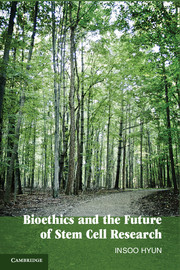2 - A Shifting Terrain
The Dynamics of Stem Cell Research
Published online by Cambridge University Press: 05 May 2013
Summary
What is the best way to think about stem cell research? What are its unique characteristics, and which of these features are ethically important? Let us address these questions systematically. Stem cell research is first and foremost a scientific discipline. From this obvious point follows a series of important considerations often overlooked in stem cell ethical debates.
First, as a scientific endeavor – with academic linkages dating back to the rise of the modern worldview – stem cell research eschews large swaths of premodern thought, such as Aristotelian animism, in favor of modern materialist explanations. For example, rather than maintaining, as the Aristotelian Scholastics did, that nascent human bodies are impelled to unfold an innate developmental nature through the workings of an animating soul, stem cell scientists embrace the mechanistic view that human biological development is nothing more than a cascade of innumerable physical events. Thus one of the primary goals of stem cell scientists is to understand how the soulless chemistry of genetic information becomes translated into the development of tissues and complex organ systems.
- Type
- Chapter
- Information
- Bioethics and the Future of Stem Cell Research , pp. 21 - 56Publisher: Cambridge University PressPrint publication year: 2013



